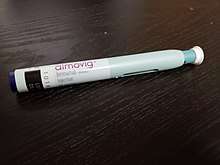Erenumab
Erenumab, sold under the brand name Aimovig, is a medication which targets the calcitonin gene-related peptide receptor (CGRPR) for the prevention of migraine.[2][3][4] It was the first of the group of CGRPR antagonists to be FDA approved in 2018.[5] It is a form of monoclonal antibody therapy in which antibodies are used to block the receptors for the protein CGRP, thought to play a major role in starting migraines.[6]
 A standard 70mg/mL Aimovig autoinjector | |
| Monoclonal antibody | |
|---|---|
| Type | Whole antibody |
| Source | Human |
| Target | CGRPR |
| Clinical data | |
| Trade names | Aimovig |
| Other names | AMG-334, erenumab-aooe |
| AHFS/Drugs.com | Monograph |
| MedlinePlus | a618029 |
| License data | |
| Pregnancy category | |
| Routes of administration | Subcutaneous injection |
| ATC code | |
| Legal status | |
| Legal status |
|
| Pharmacokinetic data | |
| Bioavailability | 82% (estimated) |
| Metabolism | Proteolysis |
| Elimination half-life | 28 days |
| Identifiers | |
| CAS Number | |
| DrugBank | |
| ChemSpider |
|
| UNII | |
| KEGG | |
| ChEMBL | |
| Chemical and physical data | |
| Formula | C6472H9964N1728O2018S50 |
| Molar mass | 145871.98 g·mol−1 |
Medical uses
Erenumab is indicated for the prevention of migraine in adults.[5]
It is administered by subcutaneous injection.[7]
Side effects
Common side effects are constipation, pruritus, muscle spasms, as well as mild and mostly transient reactions at the injection site.[8]
Interactions
Erenumab was shown not to interact with ethinyl estradiol, norgestimate or the migraine drug sumatriptan. It is expected to generally have a low potential for interactions because it is not metabolized by cytochrome P450 enzymes.[8]
Pharmacology
Mechanism of action
Erenumab is a fully human monoclonal antibody blocking the calcitonin gene-related peptide receptor (CGRPR).[7][9]
Pharmacokinetics
After subcutaneous injection, the erenumab has an estimated bioavailability of 82%. Highest blood plasma concentrations are reached after four to six days. Like other proteins, the substance is degraded by proteolysis to small peptides and amino acids. It has an elimination half-life of 28 days.[8]
History
Development
Erenumab was developed by Amgen Inc in conjunction with Novartis.[4]
In the phase III STRIVE clinical trial 955 patients were divided into three groups in a 1:1:1 ratio. Each group was injected subcutaneously monthly with 0, 70 or 140 mg erenumab over a period of 6 months. The results were measured as mean monthly migraine days in months 4, 5, and 6. At baseline the patients experienced between 4 and 14 migraine days per month with an average of 8.3. The medication significantly reduced the number of migraine days per month by 3.2 in the 70-mg group and 3.7 in the 140-mg group, versus 1.8 in the placebo (0-mg) group.[4][10]
Approval and marketing
The United States Food and Drug Administration (FDA) approved the medication for the preventive treatment of migraine in adults on May 17, 2018. The list price was reported to be US$6,900 per year.[11] It was approved for medical use in the European Union on July 26, 2018.[12][13]
In the United Kingdom, Erenumab was approved by the Scottish Medicines Consortium, but the National Institute of Health and Care Excellence rejected the drug on the basis that its cost-effectiveness was not sufficiently proven.[14][15]
See also
- Other anti-migraine antibodies blocking the calcitonin gene-related peptide (CGRP) pathway:
References
- "Erenumab (Aimovig) Use During Pregnancy". Drugs.com. 17 April 2019. Retrieved 5 May 2020.
- "Statement On A Nonproprietary Name Adopted By The USAN Council - Erenumab" (PDF). American Medical Association. 24 November 2015. Archived (PDF) from the original on 4 November 2018. Retrieved 4 November 2018.
- World Health Organization (2016). "International Nonproprietary Names for Pharmaceutical Substances (INN). Proposed INN: List 115" (PDF). WHO Drug Information. 30 (2).
- Goadsby; et al. (2017). "A Controlled Trial of Erenumab for Episodic Migraine". N. Engl. J. Med. 377: 2123–2132. doi:10.1056/NEJMoa1705848. PMID 29171821.
- "FDA Approves First-in-Class Drug Erenumab (Aimovig) for Migraine Prevention". Medscape. 17 May 2018.
- Edvinsson, Lars (December 2018). "CGRP Antibodies as Prophylaxis in Migraine". Cell. 175 (7): 1719. doi:10.1016/j.cell.2018.11.049.
- "Aimovig (erenumab-aooe) FDA Approval History". Drugs.com.
- "Aimovig: EPAR - Product Information" (PDF). European Medicines Agency. 8 August 2018.
- "Amgen Presents First-Of-Its-Kind Data At AAN Annual Meeting Reinforcing Robust And Consistent Efficacy Of Aimovig (erenumab) For Migraine Patients With Multiple Treatment Failures". Drugs.com. 17 April 2018.
- Erenumab to prevent migraine: results from phase III STRIBE", Pharma World, December 14, 2017.
- Kolata, Gina (17 May 2018). "F.D.A. Approves First Drug Designed to Prevent Migraines". The New York Times. ISSN 0362-4331. Retrieved 26 September 2019.
- "Aimovig EPAR". European Medicines Agency (EMA). Retrieved 4 May 2020.
- "First drug to prevent chronic migraines approved by EU". The Guardian. 31 July 2018. Retrieved 19 September 2018.
- Gallagher, James (26 September 2019). "'Life-changing' migraine drug rejected for NHS". BBC News Online. Retrieved 26 September 2019.
- "New migraine drug not cost-effective NICE says in draft guidance". NICE. Retrieved 26 September 2019.